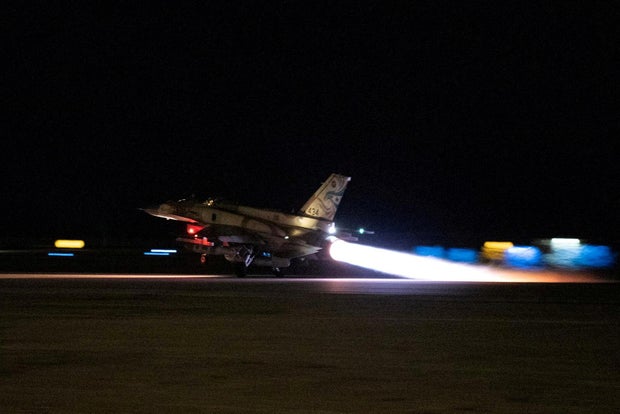Israel conducts “targeted strike” in Beirut despite U.S. warning against escalation after pagers explode
Beirut, Lebanon — The Israeli military said it carried out a “targeted strike” in Beirut on Friday, as social media video showed smoke rising from the site of an attack in the Lebanese capital.
“At this moment, there are no changes in the Home Front Command defensive guidelines,” the Israel Defence Forces said in a statement.
Lebanese health officials said at least 8 people were killed and 59 people were wounded in the strike. The IDF said it had “eliminated” Hezbollah commander Ibrahim Aqil.
“During the strike, senior operatives in Hezbollah’s Operations Staff and commanders from the Radwan Unit were eliminated alongside Aqil,” the IDF said in a statement, claiming the killed Hezbollah operatives, including Aqil, had been planning an attack on Israel “in which Hezbollah intended to infiltrate Israeli communities and murder innocent civilians.”
The United States had previously offered a “reward of up to $7 million for information leading to the identification, location, arrest, and/or conviction,” of Aqil, who it said was a leader of Hezbollah in the 1980s, when the group claimed responsibility for the 1983 bombing of the U.S. Embassy in Beirut.
The White House earlier warned both Israel and the Iran-backed Hezbollah group against “escalation of any kind” following this week’s synchronized pager and walkie talkie explosions targeting Hezbollah members, but overnight, Israeli warplanes carried out dozens of strikes across southern Lebanon, and Hezbollah has continued firing back.
Israel Defense Forces/Handout/REUTERS
There were loud explosions and fires ignited by what the IDF said were strikes targeting hundreds of active Hezbollah rocket launchers in Lebanon early Friday. Hezbollah struck northern Israel again in a counterattack, killing at least two soldiers, according to Israeli officials.
The deadly escalation in violence followed a televised address from a weary-looking Hassan Nasrallah — the leader of Hezbollah — who admitted this week’s pager and walkie talkie explosions had delivered a “severe blow” to the powerful group, which like Hamas has long been designated a terrorist group by Israel and the U.S.
Nasrallah accused Israel of not only violating “all red lines” with the explosions but of a “declaration of war.”
Israel has not publicly claimed the complex communications device attacks, but CBS News learned that American officials were given a heads-up by Israel about 20 minutes before the operations began in Lebanon on Tuesday. There were no specific details shared about the methods to be used.
For two terrifying days in Lebanon, thousands of low-tech communications devices — many used by Hezbollah members — exploded simultaneously across the country, wounding over 3,000 people and killing at least 37, including children, according to Lebanon’s health ministry.
In his address, Nasrallah vowed that Israel would not achieve its goal of enabling the return of tens of thousands of people displaced from their homes in northern border towns. Even as he spoke on Thursday, however, sonic booms echoed above Beirut as Israeli fighter jets roared over the city, flexing Israel’s military might.
But as the U.S. warning Thursday indicated, the next moves — be they further retaliation from Hezbollah or ground operations by the IDF against the group — could have major consequences.
“Ultimately, if they [Israel] do invade, they would have to occupy” southern Lebanon, regional analyst Makram Rabah told CBS News. “This would lead to a kind of a slow, depleting war for Israel, and this would, more importantly, legitimize Hezbollah.”
But hundreds of Hezbollah fighters were likely injured by the explosives attacks, which almost certainly left the group’s communications networks in complete disarray. And despite warnings from Israel’s defense chief of “a new phase” in the country’s war with Iran’s so-called proxy groups, and one IDF division already being transferred there from Gaza, there’s also been no major Israeli build-up of forces or hardware along the Lebanon border seen yet.
contributed to this report.



